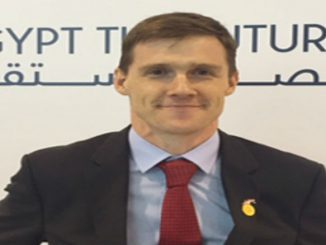
Imad, an Egyptian civil servant, whose salary barely lasts a month, expressed his dissent from the rising in prices saying, “Electricity is up, food is up. The only thing that doesn’t rise in Egypt is people’s pay yet all they talk about is cutting subsidies,” said Imad, reported Reuters.
Imad, who once considered himself middle class, now regrets joining the protests that helped bring Sisi to power. Even with regular raises, his 2,000 pounds ($225) a months salary cannot keep pace with rising prices.
Imad said,”We are not below the poverty line. We are below the round…. They want us to be so preoccupied looking for bread that we think of nothing else.” He added, “Anyone who protests or peaks out now is accused of being Brotherhood.”
Ahead of the International Monetary Fund (IMF) loan, the Egyptian government is taking strict austerity measures such as cutting subsidies and imposing new taxes to reduce the budget deficit and rebalance currency markets, policies promised to the IMF to secure $12 billion of lending over three years.
“But political opposition to measures involving subsidy cuts, local currency devaluation, and new taxes while tens of millions rely on state-subsidized food, make the program ambitious,“ said Reuters.
The cost of failure, as economists say, is high.
The budget deficit is near 10% of GDP. Inflation is 14%. A shortage of foreign currency has hit imports.
Withdrawal of foreign investors whose business was shut after being hit by capital and import controls imposed over the last 18 months.
Shortage in foreign currency acts as a barrier to acquire import components or pay a premium above 40% to obtain dollars on the black market.
According to Reuters, “They talk of survival, not growth.”
In this context, Angus Blair- chief operating officer of Pharos Holding-said, “It’s very clear that circumstances have led Egypt to really need IMF support… it will have to make changes to ensure the implementation of the plan it presented to the IMF.”
“The system in Egypt, as in overall governance, is slow… and this is a reform program that calls for quick action and bravery, especially because some of the impact will be inflationary.”
However, those reforms if implemented sharply will lead to a great public dissent especially from the low-income and poor class society who constitute the major sector in Egypt’s social class.
As a result, all Egypt’s presidents tend to avoid these measures recalling poor Egyptians riot when President Anwar Sadat removed them on flour, rice, and oil in 1977, part of an effort to secure IMF-backed financing.
He reinstated later from the decision. Though Egypt has returned to the IMF virtually every decade since the 1970s, implementation of reforms has been mixed.
More recently, Egypt negotiated two IMF deals that were never finalized, including a $4.8 billion loan initially agreed in 2012.
Many Egyptians see the program as being foreign imposed and are convinced it will hurt all but the richest.
But now the situation is different as the political will undermines the people’s will. The political will resides in Abdel Fattah al-Sisi recent statements infer that he has chosen to take the Egyptian people through the hard path.
Chris Jarvis, head of the IMF’s Egypt mission, said those deals had failed due to a lack of political will at the top to implement reforms. This time, he said, political commitment appeared stronger. Abdel Fattah al-Sisi said last week he would not hesitate “for one second” to take the difficult steps necessary to ensure Egypt lives within its means.
As a result, strict measures have started on track. This month, electricity prices were raised by 20-40% under a five-year program that will see power subsidies gradually eliminated. Petrol subsidies are next. Reforms to the civil service have been passed by parliament, though heavily diluted.
But critics believe that the outcome of these changes on the economy will be mild and the Gulf cash is quite an evidence. Since al-Sisi military coup against the first democratically elected President Mohamed Morsi, billions of dollars showered on Egypt by Gulf Arab allies, but they were all wasted.
VTB Capital said in a note to clients ,”This support did more harm than good as it was not conditional on reform delivery, and actually removed the urgency to carry out critically-needed policy changes. Egypt now has a weaker macro/social starting point and requires deeper and, hence, more painful adjustment.”
Under al-Sisi, many inequalities that led to January Revolution that toppled Mubarak, are revived once again.Now protests are muted,Brotherhood members have been jailed, exiled or driven underground. Liberal activists who initially backed Sisi have also been silenced. A law restricting protest has ended the mass movements that helped unseat two presidents in three years.
“A group of socialist parties has issued a statement rejecting the IMF deal they say saddles Egypt with more debt and leaves it beholden to foreign entities. But none of the parties have parliament seats and there have been no credible protest calls,” said Reuters.
“The government’s first test is a law proposing VAT at 14 %that is being debated in parliament but faces opposition from lawmakers worried about inflation.Delays to the VAT changes have already held up the first tranche of a $3 billion World Bank loan. The first $2.5 billion IMF payment is not linked to specific measures but subsequent installments are.” That means that Egypt will be serious in implementing quickly the IMF reforms.
Moreover, foreign exchange policy is another crucial issue, Egypt has promised a more flexible exchange rate to ease the foreign exchange shortage and end the black market for dollars. The move infers a second devaluation of the pound this year, raising inflation, but the central bank says it must first build foreign reserves from $15.5 billion to $25 billion, a figure it hopes to reach by year-end.



